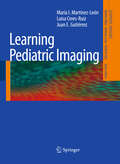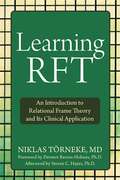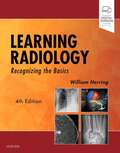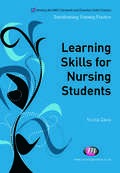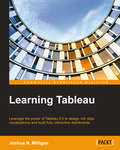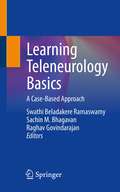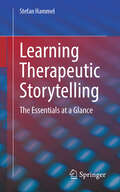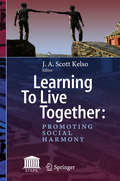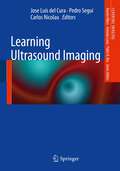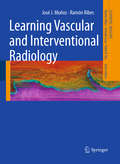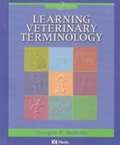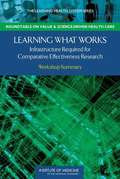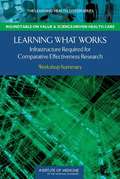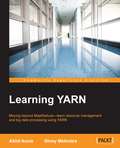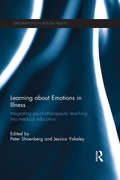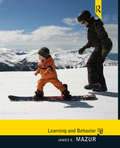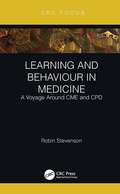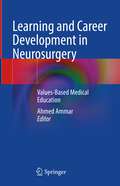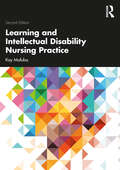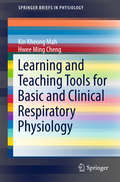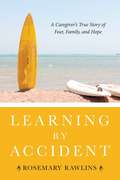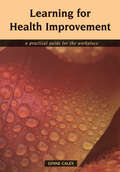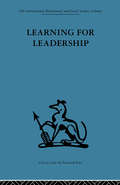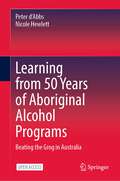- Table View
- List View
Learning Pediatric Imaging
by Luisa Ceres-Ruiz María I. Martínez-León Juan E. GutierrezThis book, in a user-friendly format, is an ideal introduction to pediatric diagnostic imaging. It presents 100 cases drawn from clinical practice that range from commonly encountered disorders to complex and infrequent situations which must be recognized by the practitioner. Each case serves to identify essential imaging features of the pathology under consideration and will assist the reader in diagnosing similar cases. The book is divided into ten chapters, each comprising ten cases that are presented in a standard way. After discussion of the disorder in question, four representative images are displayed and described with special attention to distinctive features. In addition, informative key references are provided, including a book or book chapter, a web link, and ten recent articles.
Learning RFT: An Introduction to Relational Frame Theory and Its Clinical Application
by Niklas TörnekeRelational frame theory, or RFT, is the little-understood behavioral theory behind a recent development in modern psychology: the shift from the cognitive paradigm underpinning cognitive behavioral therapy to a new understanding of language and cognition. Learning RFT presents a basic yet comprehensive introduction to this fascinating theory, which forms the basis of acceptance and commitment therapy. The book also offers practical guidance for directly applying it in clinical work. In the book, author Niklas Törneke presents the building blocks of RFT: language as a particular kind of relating, derived stimulus relations, and transformation of stimulus functions. He then shows how these concepts are essential to understanding acceptance and commitment therapy and other therapeutic models. Learning RFT shows how to use experiential exercises and metaphors in psychological treatment and explains how they can help your clients. This book belongs on the bookshelves of psychologists, psychotherapists, students, and others seeking to deepen their understanding of psychological treatment from a behavioral perspective.
Learning Radiology: Recognizing The Basics
by William HerringThe leading introductory radiology text for medical students and others who are required to read and interpret common radiologic images, Learning Radiology, 4th Edition, stresses an easy-to-follow pattern recognition approach that teaches how to differentiate normal and abnormal images. Dr. William Herring’s clear, conversational writing style employs a touch of humor to explain what you need to know to effectively interpret medical images of all modalities. From the basics of patient safety, dose reduction, and radiation protection to the latest information on ultrasound, MRI, and CT, this concise, user-friendly text provides a complete, up-to-date introduction to radiology needed by today’s students. Teaches how to arrive at a diagnosis by following a pattern recognition approach, and logically overcome difficult diagnostic challenges with the aid of decision trees. Features an easy-to-read bulleted format, high-quality illustrations, useful tables, and teaching boxes, as well as special content on Diagnostic Ptifalls; Really Important Points; Weblinks; and Take-Home Points. Includes three new chapters: Vascular, Pediatric, and Point-of-Care Ultrasound; Using Image-Guided Interventions in Diagnosis and Treatment (Interventional Radiology); Recognizing the Imaging Findings of Breast Disease. Helps ensure mastery of the material with additional online content, bonus images, and USMLE-style Q&A that provide effective chapter review and quick practice for your exams. Shares the extensive knowledge and experience of esteemed author Dr. William Herring?a skilled radiology teacher and the host of his own specialty website, www.learningradiology.com. Offers quick review and instruction for medical students, residents, and fellows, as well as those in related fields such as nurse practitioners and physician assistants. Includes an Enhanced eBook version with purchase. Your enhanced eBook allows you to access all of the text, figures, and references from the book on a variety of devices.
Learning Skills for Nursing Students (Transforming Nursing Practice Series)
by Alison Clark Nicky Davis Caroline Plaice Karen Sumpton Suzanne Waugh Martina O′BrienThis book helps students master the key learning skills they need to become successful learners throughout their degree and beyond. It clearly explains the core skills they will need right from the start of the course, such as writing and numeracy skills and how to organise studies. It also introduces more advanced skills that students will need as the course progresses, such as research and evidence based practice. It shows how to use these important skills to succeed both at university and as a registered nurse.
Learning Tableau
by Joshua N. MilliganIf you want to understand your data using data visualization and don't know where to start, then this is the book for you. Whether you are a beginner or have years of experience, this book will help you to quickly acquire the skills and techniques used to discover, analyze, and communicate data visually. Some familiarity with databases and data structures is helpful, but not required.
Learning Teleneurology Basics: A Case-Based Approach
by Raghav Govindarajan Sachin M. Bhagavan Swathi Beladakere RamaswamyThis book focuses on the basics of teleneurology and provides an outline of curriculum and practice with the help of clinical vignettes. It fills the gap for a text that reflects the rapidly evolving nature of the teleneurology field, with specific attention paid to examining how this can be extended to patient treatment. Recent COVID-19 pandemic rapidly revolutionized telemedicine technology and reformed the practice of medicine; this book will serve as an easy guide to physicians all over the world to adapt to changing needs of the health care system. Concise and comprehensive, this 12 chapter book covers a variety of neurological disorders and highlights specific aspects of teleneurology practice, including medicolegal issues, licensure, standard of care, ethical issues, and future trends. Designed to be a resource for students and residents, as well as medical school faculty and practicing clinicians, Learning Teleneurology Basics will prepare the reader to deliver care remotely.
Learning Therapeutic Storytelling: The Essentials at a Glance
by Stefan HammelThe book provides a hypnosystemically grounded introduction to therapeutic storytelling in medicine, child therapy, adult psychotherapy, couples therapy, family therapy, social work, pastoral care, education, coaching, supervision, and related professional fields.Contents include:The relevance of storytelling to therapy.Why, when, and how stories have therapeutic effects.Where I can use therapeutic stories.How to find the right story for the right moment.Structuring a therapeutic story.How to start and continue.Enhancing narrative skills.About the Author:Stefan Hammel works as a systemic therapist, hypnotherapist, and author. He is also an protestant hospital and psychiatric chaplain, as well as the director of the Institute for Hypnosystemic Counseling in Kaiserslautern. Additionally, he serves as a lecturer for systemic and hypnotherapeutic training institutes in Germany, Austria, and Switzerland. He conducts seminars on Ericksonian hypnotherapy, therapeutic storytelling, systemic and hypnosystemic counseling. His main areas of focus include couple and family therapy, therapy for children and adolescents, depression, anxiety, trauma, end-of-life and grief counseling, as well as supporting somatic healing processes.
Learning To Live Together: Promoting Social Harmony
by J. A. Scott KelsoThis book is devoted to the issue of how we can learn to live together in the face of division and conflict. It is dedicated to the life and work of a remarkable human being, Dr Epimenidis Haidemenakis, scientist, statesman, visionary leader, President Emeritus of the International S.T.E.P.S. Foundation and founding father of The Olympiads of the Mind (OM). The monograph consists of a collection of papers presented at the 8th and 9th Olympiads of the Mind held in Washington, DC and Chania, Crete respectively. Distinguished international scholars, government and corporate representatives, leading researchers and academics from multiple disciplines and Nobel Laureates Leon Lederman (Physics, 1988), Martin Perl (Physics, 1995) and Yuan T. Lee (Chemistry, 1986) address a broad range of issues all with the aim of improving the human condition and achieving cooperation among the people of the world. The topics include the environment, sustainability and security; diversity and how to achieve integration and peace among people in a fractured world; the important role of brain research; how to overcome poverty and inequality; how to enhance creativity and improve education at all levels; and how new technologies and tools can be used for common benefit. The culmination of the book is a call to action, to join what one might call the “OM Movement”—bringing the best minds in the world together to create solutions to world issues so that we can all live together in harmony.
Learning Ultrasound Imaging
by Carlos Nicolau Jose Luís del Cura Pedro SeguíThis book offers a practical approach to the world of diagnostic ultrasound. It has been structured in a reader-friendly, case-based format that makes it easy and enjoyable to learn the basics of the applications and interpretation of ultrasound. Each case includes illustrations, descriptions of the imaging findings, and technical details and serves to identify the essential imaging features of the pathology under consideration, thus assisting the reader in the diagnosis of similar cases. The book is divided into 17 short chapters that review the most important areas of ultrasound application and also document the latest advances in the use of contrast and interventional ultrasound. The authors treat every topic from a "how to do it" perspective with the aim of imparting their wide experience in use of the technique. This book forms part of the Learning Imaging series for medical students, residents, less experienced radiologists, and other medical staff.
Learning Vascular and Interventional Radiology
by Ramón Ribes José J. MuñozThis book is an introduction to interventional radiology. Written in a case-based format, the book is subdivided into ten chapters made up of ten vascular and non-vascular interventional radiology cases.Each case contains illustrations and legends describing the imaging findings and technical details of each intervention, comments from anatomical, physiopathological and radiological standpoints, as well as a description of the interventional procedure and the required interventional devices.The book is aimed at vascular and non-vascular interventional radiologists, vascular surgeons, radiology residents, vascular surgery residents, nurses and radiology technicians.
Learning Veterinary Terminology (Second Edition)
by Douglas F. McbrideThis text is newly updated to reflect the latest terminology and features numerous new and revised pedagogical features that make it an excellent resource both in the classroom and for self-study. Brand-new additions include several new appendices, new anatomical drawings, and a more extensive index. Many sections have been completely rewritten for consistency and greater reader comprehension, and review sections now include more thought-provoking questions and multiple-choice tests.
Learning What Works
by Claudia GrossmanIt is essential for patients and clinicians to have the resources needed to make informed, collaborative care decisions. Despite this need, only a small fraction of health-related expenditures in the United States have been devoted to comparative effectiveness research (CER). To improve the effectiveness and value of the care delivered, the nation needs to build its capacity for ongoing study and monitoring of the relative effectiveness of clinical interventions and care processes through expanded trials and studies, systematic reviews, innovative research strategies, and clinical registries, as well as improving its ability to apply what is learned from such study through the translation and provision of information and decision support. As part of its Learning Health System series of workshops, the Institute of Medicine's (IOM's) Roundtable on Value & Science-Driven Health Care hosted a workshop to discuss capacity priorities to build the evidence base necessary for care that is more effective and delivers higher value for patients. Learning What Works summarizes the proceedings of the seventh workshop in the Learning Health System series. This workshop focused on the infrastructure needs--including methods, coordination capacities, data resources and linkages, and workforce--for developing an expanded and efficient national capacity for CER. Learning What Works also assesses the current and needed capacity to expand and improve this work, and identifies priority next steps. Learning What Works is a valuable resource for health care professionals, as well as health care policy makers.
Learning What Works
by The Learning Health System SeriesIt is essential for patients and clinicians to have the resources needed to make informed, collaborative care decisions. Despite this need, only a small fraction of health-related expenditures in the United States have been devoted to comparative effectiveness research (CER). To improve the effectiveness and value of the care delivered, the nation needs to build its capacity for ongoing study and monitoring of the relative effectiveness of clinical interventions and care processes through expanded trials and studies, systematic reviews, innovative research strategies, and clinical registries, as well as improving its ability to apply what is learned from such study through the translation and provision of information and decision support. As part of its Learning Health System series of workshops, the Institute of Medicine's (IOM's) Roundtable on Value & Science-Driven Health Care hosted a workshop to discuss capacity priorities to build the evidence base necessary for care that is more effective and delivers higher value for patients. Learning What Works summarizes the proceedings of the seventh workshop in the Learning Health System series. This workshop focused on the infrastructure needs--including methods, coordination capacities, data resources and linkages, and workforce--for developing an expanded and efficient national capacity for CER. Learning What Works also assesses the current and needed capacity to expand and improve this work, and identifies priority next steps. Learning What Works is a valuable resource for health care professionals, as well as health care policy makers.
Learning What Works: Workshop Summary
by J. Michael Mcginnis Leighanne Olsen Claudia GrossmanThis collection of essays, drawn from the Institute of Medicine's Round Table on Value and Science-Driven Health Care, presents current scholarship in the development of infrastructure and methodologies for improving health system frameworks in the coming decades. Topics discussed include infrastructure; training and personnel; advanced technologies and communications; and policy, priories and implementations of a value driven agenda. Contributors are executive level health policy professionals. Annotation ©2012 Book News, Inc. , Portland, OR (booknews. com)
Learning YARN
by Akhil Arora Shrey MehrotraThis book is intended for those who want to understand what YARN is and how to efficiently used it for resource management of large clusters. For cluster administrators, this book gives a detailed explanation of provisioning and managing YARN clusters. If you are an or a Java developer or an open-source contributor, this book will help you to drill down the YARN architecture and application execution phases. This book would also help big data engineers explore YARN integration with real-time analytics technologies like Spark and Storm.
Learning about Emotions in Illness: Integrating psychotherapeutic teaching into medical education (Explorations in Mental Health)
by Jessica Yakeley Peter ShoenbergGood communication between the doctor and patient is essential for the patient to establish a trusting relationship with their doctor and to make the best use of the appropriate treatment. Traditional methods for teaching communication skills have focused on simulated clinical situations in which students learn how to improve their communication, with actors playing the part of the patients, rather than from live experiences with patients. Psychodynamic psychotherapy, with its emphasis on learning to reflect on experiences, offers the student the possibility of learning from a real experience with a patient. Such opportunities allow students to learn directly about patients’ emotions, as well as to appreciate their own emotional responses to illness and to communicate better with their patients. In this book, Peter Shoenberg, Jessica Yakeley, and their contributors who include students and teachers, discuss two different teaching approaches developed at University College London to help medical students understand the role of emotions in illness, communicate more effectively, and gain a deeper understanding of the doctor patient relationship. The benefits of Ball, Wolff and Tredgold’s Student Psychotherapy Scheme are considered alongside Shoenberg and Suckling’s short term student Balint discussion group scheme to provide clear guidance about how psychotherapeutic understanding can be used to inform medical education, with positive results. At a time when medicine is becoming increasingly technological and there is a growing demand by the public for more psychologically minded doctors, this book will be a key resource for physicians, general practitioners, psychologists, psychiatrists and psychotherapists who are involved in medical teaching and for medical students.
Learning and Behavior: Seventh Edition
by James E. MazurThis book reviews how people and animals learn and how their behaviors are later changed as a result of this learning. Nearly all of our behaviors are influenced by prior learning experiences in some way. This book describes some of the most important principles, theories, controversies, and experiments that pertain to learning and behavior that are applicable to many different species and many different learning situations. Many real-world examples and analogies make the concepts and theories more concrete and relevant to the students. In addition, most of the chapters include sections that describe how the theories and principles have been used in the applied field of behavior modification. Each chapter in the seventh edition was updated with new studies and new references that reflect recent developments in the field. The book includes a number of learning aids for students, including a list of learning objectives at the beginning of each chapter, practices quizzes and review questions, and a glossary for all important terms. Learning & Behavior covers topics such as classical and operant conditioning, reinforcement schedules, avoidance and punishment, stimulus control, comparative cognition, observational learning, motor skill learning, and choice. Both the classic studies and the most recent developments and trends in the field are explored. Although the behavioral approach is emphasized, many cognitive theories are covered as well along with a chapter on comparative cognition.? Upon completing this book readers will be able to:understand the field of learning and discuss real-world applications of learning principles.
Learning and Behaviour in Medicine: A Voyage Around CME and CPD
by Robin StevensonThis concise, practical guide supports a broadly based understanding of continuing medical education and professional development, without being overly theoretical. Opening with the history of CME and CPD, their definitions and the difference between them, this book discusses recent changes in the culture of learning in medicine, including the transition of CME from didactic teaching to interactive, focused adult learning. It describes the replacement of a curricular approach by education driven by need, which, in turn, is defined by discovery and analysis of professional practice gaps. Particular emphasis is placed on the misdiagnosis gap, its causation and impact on patient care. Key Features Articulates the essential difference between CME and undergraduate and postgraduate medical education Highlights the importance of professional practice gap discovery and analysis Outlines the planning and design of CME in relation to Moore’s Outcomes Pyramid Describes the various modalities of CME provision, methods of outcome assessment and accreditation systems Confirms the critical role that CPD plays in revalidation and maintenance of certification, with important considerations around fitness to practise It is essential reading for those who use CME and those who plan, design, deliver and accredit CME, including practising healthcare professionals from all specialties, and CME providers, both independent and linked to specialist societies.
Learning and Career Development in Neurosurgery: Values-Based Medical Education
by Ahmed AmmarThe neurosurgical, surgical and medical training and practice models have to keep up with the technological revolution in the 21st Century as our lives changed on a swift base. Making bioethics and metacognition a cornerstone in medical education and practice will flourish our humane societies. Metacognition is thinking about one’s thinking, to plan, monitor and assess one’s understanding and performance. By adherence to medical ethics and Values-Based Medicine (VsBM) as guiding principles, we can develop benevolent medical practice. To enhance knowledge application, skills, and character qualities in realms beyond the immediate context in which they were learned. In this book, we developed a framework on how to evolve medical education and training by utilizing hi-tech. We divided the book into five principal components; Current and traditional root analysis of the learning process, Ethics and metacognition of education, learning and career development, Obstacles, difficulties and setbacks in learning and career development process, Learning in the digital era, and Mentorship. The author believes we are entering a new era of information technology, which will have a significant impact on the education, sciences, strategies and philosophy. Therefore, in preparation for this colossal transformation, the author brings together the best brains in the neurosurgical field from around the globe. Twenty distinguished Professors of Neurosurgery and educators from Canada, the USA, Colombia, the UK, Italy, the Netherland, India, Japan, China, Rwanda, Egypt and Saudi Arabia gathered their experiences and thoughts in this book to shade light on an evolving world that will be the norm in near future.
Learning and Intellectual Disability Nursing Practice
by Kay MafubaThis well-respected core text provides a comprehensive solid foundation for students of nursing and practitioners who care for and or support people with learning/intellectual disabilities in a range of health and social care settings and scenarios. This book addresses learning/intellectual disability nursing from various perspectives, including historical and contemporary practice, health promotion, interventions for good mental health, people with profound disabilities and complex needs, care across the lifespan, and forensics. This new edition has been comprehensively updated throughout and now includes two entirely new chapters. One covers liaison nursing, and the other explores the future for learning/intellectual disability nursing. The book includes numerous case studies and learning activities to support the reader, as well as remaining clinically relevant. Uniquely this text is linked and benchmarked to the Nursing and Midwifery Councils, UK – Future Nurse Standards of Proficiency and the Nursing and Midwifery Board of Ireland’s Competencies for nursing students. This text is essential reading for anyone studying learning/intellectual disabilities at undergraduate and post-graduate levels; it will also be a useful resource for the wider family of nursing, as well as health and social care professionals.
Learning and Teaching Tools for Basic and Clinical Respiratory Physiology
by Kin Kheong Mah Hwee Ming ChengThis volume synthesizes pathways in respiratory mechanics and the dynamics of air-blood and blood-cellular gas exchange for students and teachers in respiratory physiology. The authors strive to make physiology fun to learn. This aspect of knowledge acquisition is reflected in the way topics are approached, for example by using playing cards in what is coined 'Respi-CARDology'. The first section of this book reviews the framework and foundations of basic respiratory physiology. Since this book was not written to be a comprehensive physiology text, the authors have focused on leading students to appreciate and understand integrative principles and homeostatic mechanisms in lung function. The second section of this book mainly deals with the clinical application of fundamental knowledge of respiratory physiology.
Learning by Accident: A Caregiver's True Story of Fear, Family, and Hope
by Rosemary RawlinsOn a sunny spring day, in an ordinary suburban kitchen, the phone rings. There's been an accident. In one heartbeat, a family's life is changed forever.After her husband, Hugh, is hit by a car while riding his bicycle, Rosemary Rawlins is plunged into twelve months of marathon caregiving, without the promise of a positive outcome. She works herself to the point of exhaustion to bring her grievously injured husband-who suffered a traumatic brain injury, necessitating the removal of half his skull-back home and back to himself. Then, as he slowly begins to reclaim his life, Rosemary falls apart.She can't sleep. Her heart pounds. Her joy and trust in the world dissolve into endless anxiety. She lays awake at night wondering how her marriage will survive. Will she ever be able to relate to Hugh again? What will become of their relationship? Their children? Do they recognize each other-literally-as the people they fell in love with and married decades ago? How can she let go of her fears? And what can she learn from them?Learning by Accident is a caregiver's story of ambiguous loss, family love, and emotional healing. This compelling personal account demonstrates with heart and humor that what we fear can be more debilitating than any physical injury. And that sometimes starting over is exactly what we need.
Learning for Health Improvement: Pt. 1, Experiences of Providing and Receiving Care
by Pauline Boss Lynne CaleyWith growing pressure on the NHS to keep staff up-to-date, committed and equipped with flexible skills profiles, "Learning for Health Improvement" offers creative ways to invest in people development. It explores the issues relating to work based learning, and argues it is much broader than mere skills acquisition and is wide ranging, collaborative and socially situated. Adopting a practical approach, the book makes use of quizzes, stories, dilemmas and audit tools to assist in comprehension and work-based application. "Learning for Health Improvement" is essential reading for managers and supervisors in healthcare, policy makers and shapers, and healthcare human resources and training managers. It will also be of great interest to healthcare lecturers and academics.
Learning for Leadership: Interpersonal and intergroup relations
by A K RiceTavistock Press was established as a co-operative venture between the Tavistock Institute and Routledge & Kegan Paul (RKP) in the 1950s to produce a series of major contributions across the social sciences. This volume is part of a 2001 reissue of a selection of those important works which have since gone out of print, or are difficult to locate. Published by Routledge, 112 volumes in total are being brought together under the name The International Behavioural and Social Sciences Library: Classics from the Tavistock Press.Reproduced here in facsimile, this volume was originally published in 1965 and is available individually. The collection is also available in a number of themed mini-sets of between 5 and 13 volumes, or as a complete collection.
Learning from 50 Years of Aboriginal Alcohol Programs: Beating the Grog in Australia
by Peter d’Abbs Nicole HewlettThis open access book deals with community-based attempts on the part of Aboriginal communities and groups in Australia to address harms arising from alcohol misuse. Alcohol-related harms are viewed as both a product of colonisation and dispossession and a contributor to ongoing social, economic and health-related disadvantage, both in Australia and in other countries with colonised Indigenous populations, such as Canada, the US and New Zealand. This book contributes to an evidence-base by bringing together a selection of existing Australian documents considered by the editors to have continuing relevance to all those concerned with dealing with alcohol-related harms among Aboriginal peoples, These are contextualised in original chapters that recount key events, ideas, and programs. The book is a practical resource for all people and groups concerned with addressing Aboriginal and Torres Strait Islander alcohol-related harms, both at the community level and at the level of policy-making and administration.
